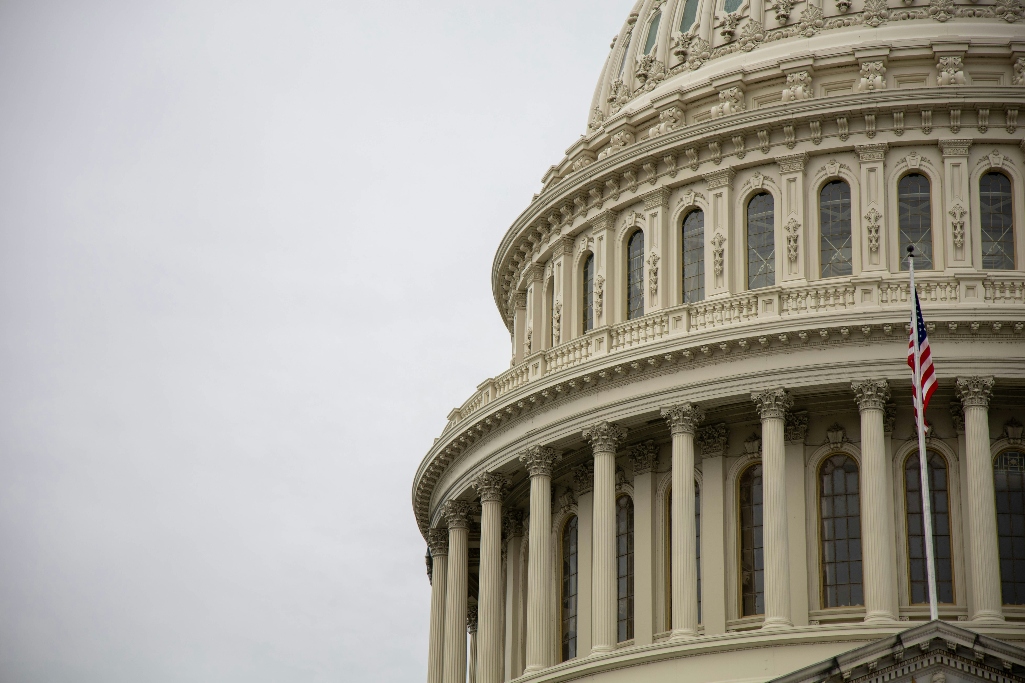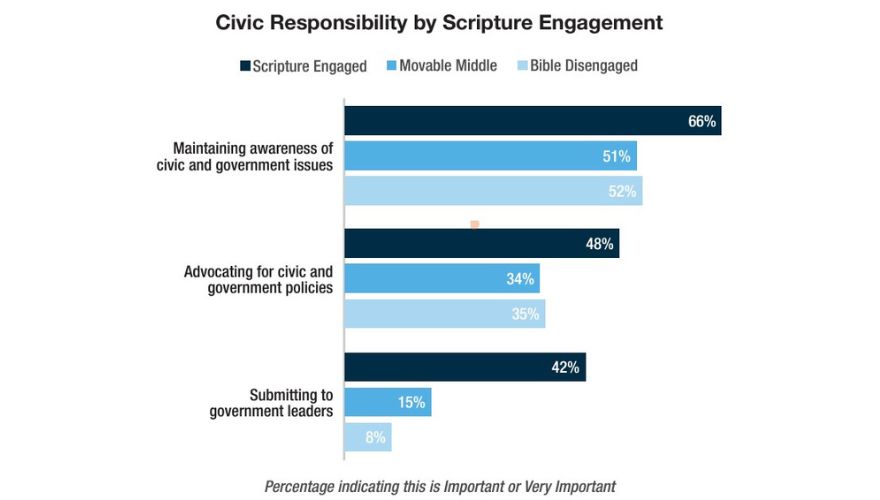
PHILADELPHIA (BP) — Christians engaged in Scripture place the highest premiums on civic advocacy and engagement, the American Bible Society (ABS) said in its latest release from the 2024 State of the Bible.
For purposes of categorizing respondents, the study uses the following group titles: Scripture Engaged, Bible Disengaged and Movable Middle.
Falling in a presidential election year, the study shows Scripture Engaged Christians place more importance than others on being aware of civic and government issues, advocating for civic and government policies and submitting to government leaders.
Specifically, 66% of Scripture Engaged Christians said it is important or very important to maintain awareness of civic and government issues, 48% placed the same importance on advocating for civic and government policies, and 42% said the same of submitting to government leaders.
“On every point — awareness, advocacy and submission — the Scripture Engaged are far more apt to tout the importance of civic responsibility,” researchers wrote in the study, outpacing those described as Bible Disengaged and those in the Movable Middle, a group that is somewhat engaged in and considered more apt to embrace Scripture. “We see little difference between the Movable Middle and the Bible Disengaged on awareness and advocacy, but the Scripture Engaged clearly place a higher value on these aspects of citizenship.”
But the Scripture Engaged, considered the most committed of all Christians, still rank the importance of advocacy and submission below awareness on the study’s seven-point scale of importance, with only awareness ranking above 50%.

In the 2024 report’s fourth chapter, released July 11, researchers focused on “Love in Action,” tabulating the importance of several aspects of the biblical command to love one’s neighbor (Matthew 22:39). Researchers reported on perspectives rather than actual activity.
Researchers invoked the election year in explaining a three-year decline among practicing Christians in the importance of welcoming immigrants, befriending people of other races and caring for the environment.
“The political climate certainly affects the responses here. Our survey presents the issues in a few words, without further definition,” researchers wrote. “Respondents will, of course, add their own context — for instance, whether the immigration is legal or illegal. With that in mind, we find significant movement on these issues in recent years, especially among practicing Christians.”
Among practicing Christians, the importance of welcoming immigrants into communities fell from 4.3 on a six-point scale in 2022, to 3.9 in 2024. While befriending people of other races ranked 4.7 on the scale in 2022, it ranks 4.5 today. Caring for the environment sat at 4.7 in 2022, but ranks 4.6 in 2024.
“All groups are less apt to consider it important to welcome immigrants than they’ve been in previous years, but the decline is greatest among Practicing Christians,” researchers wrote. “Non-Christians now place more importance on this than Practicing Christians do.”
Otherwise, areas of engagement related to loving others have ranked about the same for the past four years, researchers said, including caring for the imprisoned and advocating for those oppressed by society.
An interest in cross-racial engagement that surged after the 2020 death of George Floyd has cooled, researchers found.
“In the next year or two, we saw big companies committing to diversity and communities tearing down statues,” researchers noted. “But our trendline suggests a drop-off of attention in the last two years.”
Still, study participants largely value being good neighbors, despite differing interpretations of who qualifies as a neighbor.
Demographically, loving one’s neighbor is esteemed highest among Boomers, women, the Scripture Engaged, city and suburb dwellers, those in the northeastern U.S., and homeowners.
The University of Chicago’s National Opinion Research Center (NORC) conducted the research Jan. 4-23, compiling findings based on responses from 2,506 online interviews completed among more than 9,900 adults contacted in the nationally representative AmeriSpeak panel.
ABS will release a chapter of the 2024 study monthly through December. Future releases will focus on the Bible’s intersection with artificial intelligence, well-being, the church, hope, hardship, loneliness and philanthropy.
The fourth chapter of the report is available here.
(EDITOR’S NOTE — Diana Chandler is Baptist Press’ senior writer.)


